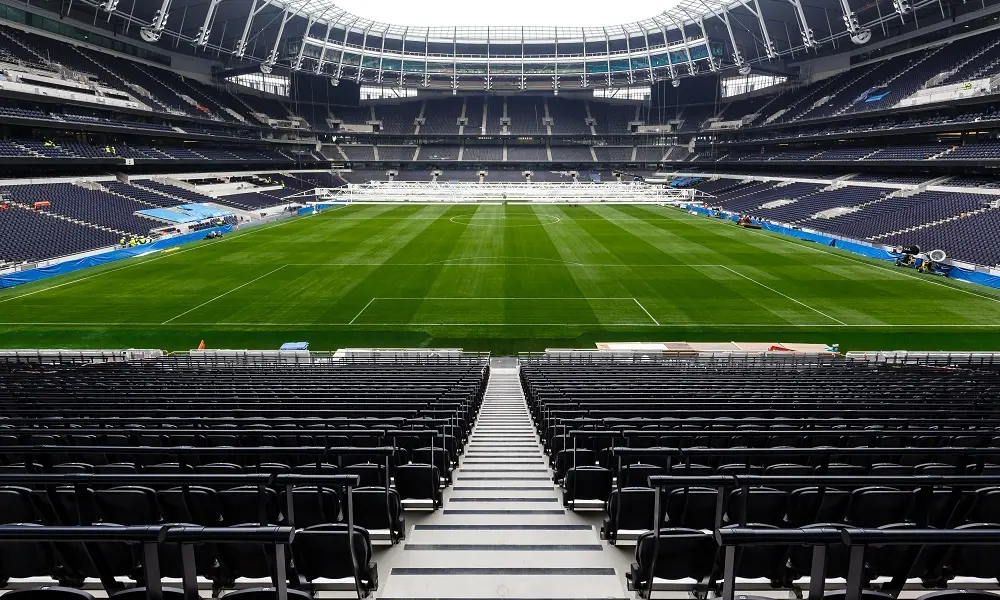
The football pitch in three pieces
Retractable pitches around the world
⚽ What other stadiums have removable grass fields?
While the Tottenham Hotspur Stadium now has the first retractable pitch that divides into sections before it is rolled away, it is not the first stadium in the world to have a removable grass field.
In 1998, the first major sports stadium to get a so-called ‘convertible pitch’ was the GelreDome in Arnhem, Netherlands. Home to the football club Vitesse Arnhem, a huge concrete tray that contains the turf can be pushed out through an 85-metre opening under the south stand to make way for concerts and other sporting events. It takes around three and a half hours to move the enormous slab and it is usually left outside the stadium in the wind, rain and sunshine so that the grass can grow.
In 2001, retractable pitches were installed at both the Arena AufSchalke football stadium, which is now known as the Veltins-Arena, in Gelsenkirchen, Germany, and at the Sapporo Dome in Toyohira-ku, Japan. The 11,000-tonne playing field at the Veltins-Arena, home of the Bundesliga side FC Schalke 04, can take six to eight hours to move in or out of the stadium. Four hydraulic presses push the lawn about half a metre at a time in what can be a 340-metre round trip.
The Sapporo Dome primarily hosts baseball and football games for the Hokkaido Nippon-ham Fighters and Consadole Sapporo FC. The pitch here is the world’s first ‘hovering football stage’, where the 8,300-tonne field partly floats on a cushion of air as it moves, reducing the weight that the 34 wheels underneath have to carry. To convert the stadium, the artificial baseball field rolls away and a bank of seats are retracted into the walls. The pitch rolls into the arena and rotates 90 degrees along with a revolving bank of seats until moved into place, and the retractable seats move back into place. In total, the whole process can take four or five hours.
Most recently the 63,400-seat University of Phoenix Stadium in Glendale, just west of Phoenix, Arizona, opened in 2006. It makes use of the space outside the stadium, rolling the 9,300-tonne grass playing surface out through an opening at one end in around one hour. This has allowed the stadium to host events as diverse as motorsports, wrestling matches, NFL games, international football matches and concerts by acts including Beyoncé, Taylor Swift and U2.
For 118 years, White Hart Lane, home of Tottenham Hotspur Football Club, has been one of the most famous addresses in football history. The stadium hosted some of the team’s most dramatic moments, from famously picking apart the formidable Polish side Górnik Zabrze in its first ever European Cup appearance in 1961 to defeating Inter Milan during its first Champions League outing in 2010. In total, Spurs played 2,533 competitive games at the North London stadium before demolition work began in May 2017 to make room for a new 62,062 seat stadium. This redevelopment, rumoured to cost around £850 million, has not only almost doubled White Hart Lane’s previous capacity, but has also turned it into one of the most flexible major venues in the world. At the very heart of the stadium, the pitch has been transformed from a simple patch of grass into an ambitious engineering project.
Matches at the new Tottenham Hotspur Stadium will be played on the world’s first dividing, retractable grass football pitch. Mounted in three enormous trays, the grass surface can be rolled away beneath the south stand to reveal an artificial NFL American football field beneath. The Premier League Club already has a 10-year contract with the NFL to stage a minimum of two games a season, using the artificial surface. The retracting pitch means that the stadium can quickly convert from hosting a football match on the grass pitch to an NFL game on the artificial field in just a few hours. The hard-wearing artificial surface also means that the stadium can host other events, such as concerts, without damaging the grass. For most football grounds hosting concerts and other events involves putting thick matting onto the pitch, which can quickly kill the grass and requires new turf to be laid before the next match can be played. This can take days, if not weeks, for most stadiums.
The football club turned to Sheffield-based engineering firm SCX to help deliver the retractable pitch. SCX specialises in complex kinetic architecture having previously created the enormous retractable roof over Centre Court and No.1 Court at Wimbledon. It also built a 900-tonne section of removable turf at Ascot racecourse that is wheeled out of the way to reveal an access road to the paddocks in the centre of the track so that vehicles do not damage the race course. However, despite this previous experience, the stadium’s new retractable pitch has been one of the most challenging projects the firm has undertaken.
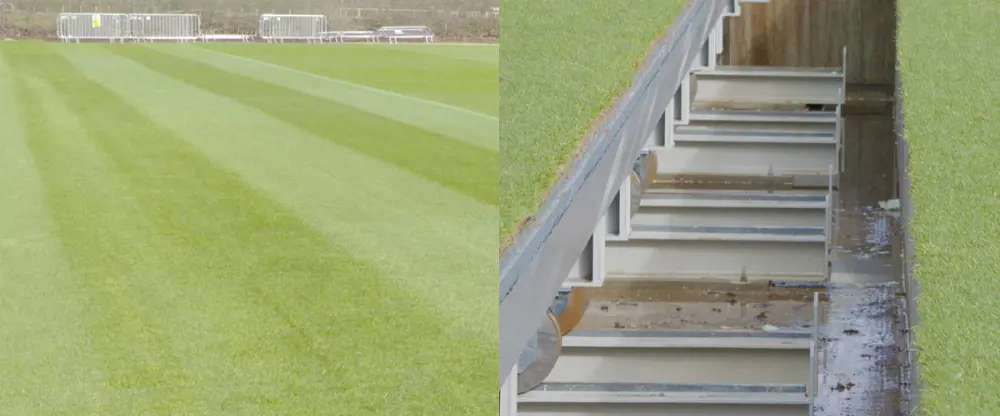
Extensive testing of the sliding pitch prototype was undertaken at Tottenham Hotspur’s training centre in Enfield © Tottenham Hotspur / SCX Special Projects
The columns that support the terracing underneath the south stand meant that the pitch could not roll out from beneath as a single entity, as has been done with other retractable pitches around the world. Instead, SCX opted to split the pitch into three lengthwise sections that divide roughly along the outer edges of the penalty box.
Once this concept had been agreed, the club tasked its Head of Moving Structures Nick Cooper FREng and his team with designing and fully integrating the moving pitch, surrounds and supporting services into the stadium build programme.
Each section is mounted on rails that are hidden beneath the NFL pitch, which allow them to be rolled in and out of position through a complex set of manoeuvres from under the south stand. First the central section rolls in and then the outer sections pull alongside and move inwards to meet the central piece.
Joining the pitch
The whole pitch weighs over 9,000 tonnes, more than the Eiffel Tower in Paris. Each of the three sections need to fit together seamlessly so that fans watching football games, and footballers taking part, cannot tell that matches are happening on trays mounted 1.6 metres above solid ground. Ensuring the accuracy required to get this kind of join along the entire 118-metre-long edge was one of the most difficult aspects of the project for the engineering team. Each section, composed of 33 metal trays welded together from 16-millimetre-thick steel plates, needs to line up perfectly when brought together.
During fabrication, the trays were bolted together in the exact same order and under the same conditions to control the effects of heating and cooling, caused by the welding, making the steel buckle and bow in different ways. The team built a test site at Tottenham Hotspur’s training centre with a section of movable turf to experiment how the pitch would fit together. With a length of 21 metres and a width of 3 metres, this gave the team a more manageable replica of the edges to experiment with.
The whole pitch weighs over 9,000 tonnes, more than the Eiffel Tower in Paris. Each of the three sections need to fit together seamlessly so that fans watching football games, and footballers taking part, cannot tell that matches are happening on trays mounted 1.6 metres above solid ground
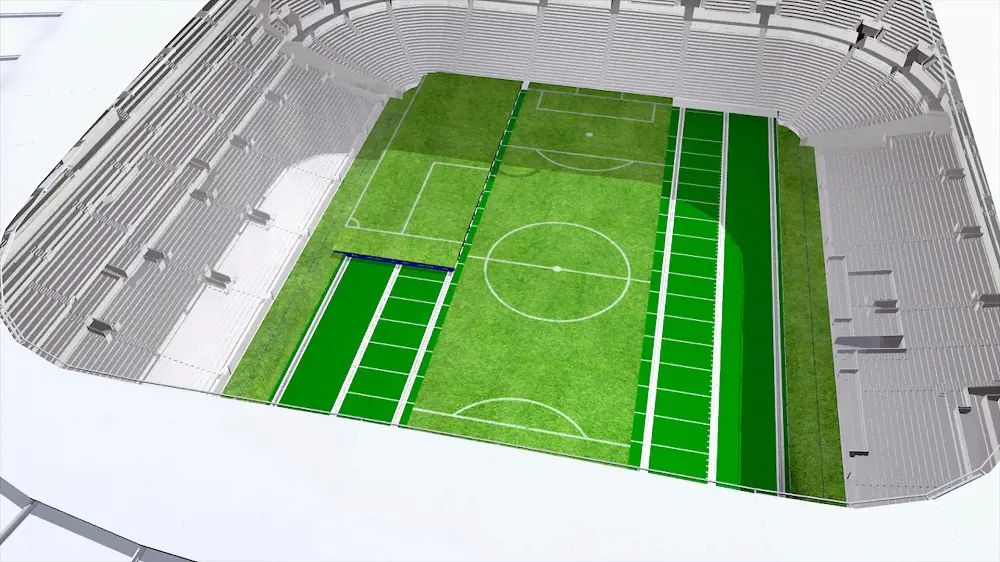
A computer-generated image shows how the three trays carrying the pitch will slide over the artificial NFL field below © Tottenham Hotspur / SCX Special Projects
The team discovered that the best way of ensuring a reliable and repeatable joint was to have the trays ‘touch’ via a three-ply rubber strip running down the entire length of each section of pitch, just beneath the turf. Alternatives included a plastic mesh that would allow the roots to knit through over time. The engineers at SCX also tested how best to pull the pitch apart again as, when the sections are joined, the grass can become entangled as roots and leaves grow. The team initially used a device similar to a pizza cutter to slice between the sections, but it left noticeable damage when the pitch was reassembled later. Instead, it found that the best approach was to simply let the turf tear naturally as the sections pulled apart, allowing it to split along its own weak points.
To ensure that each section would line up, the first tray module in each was surveyed into place to make sure it was correctly aligned, before the other trays were bolted alongside. When complete, the trays were lined with a waterproof layer before matting, gravel and soil were put on top. Then the turf itself was rolled out over the top.
On the move
Sixty-eight electric motors power every second tray in each section, with the ones on the centre rail doing most of the work, and the motors on the outside rails powering opposing wheels, running diagonally opposite. Together, they give each section a top speed of seven metres per minute. Once the goals, advertising boards and pitch surround are removed, it takes two people just 25 minutes to roll the pitch away.
To switch from one event to the other can take just four hours. As the pitch is rolled away, one operator walks in front of the moving section while another, the ‘watcher’, observes the pitch’s progress. Moving the pitch sections requires both operators to continually press down their safety buttons. An automatic slow-down system is triggered as the huge pitch sections trip sensors when the sections are 75 centimetres apart. This slows the movement down to the tenth of its top speed – just seven centimetres per minute – before triggering a second and third sensor that brings the whole structure to a halt. The motors themselves can be used to slow and brake the pitch while it is moving. Once it has stopped, a parking brake – similar to the one in a car – is applied to clamp the structure in place. The outer sections then move inwards to meet the centre of the pitch with the help of 32 hydraulic cylinders on the steel structure underneath.
Moving the pitch sections requires both operators to continually press down their safety buttons
There needs to be enough space to allow this to take place, so the team created touchlines that move too. Along the length of the pitch, touchlines are mounted on top of a huge steel structure with artificial turf bonded to the surface. Six-metre-wide flaps on the inside edge of this structure can be lifted or lowered using hydraulic actuators.
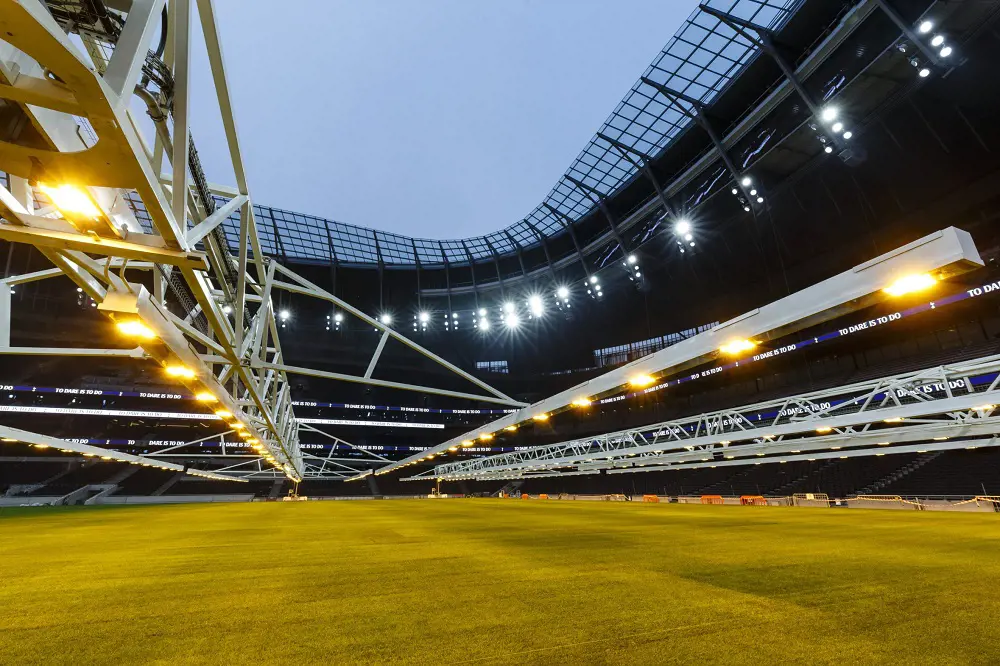
The integrated grow lighting system at the new stadium is a moving structure that weighs approximately 120 tonnes with 864 individual lights covering a total of 7,525 square metres. It is lifted hydraulically onto rails mounted permanently on the east and west pitch trays and then seamlessly rolls from one end of the pitch to the other. This enables full coverage of the pitch without equipment ever coming directly into contact with the grass surface © Tottenham Hotspur / SCX Special Projects
Once the pitch is in place, hydraulic cylinders raise the sidelines before the flaps are lowered to rest on the edge of the turf. Ramps in each corner of the pitch also pivot upwards with the touchlines to give access from beneath the stands. Then the entire structure is locked into place. At the north end of the stadium, a third set of flaps hides a series of growlights and sprinklers that can be wheeled out over the pitch between games to give the grass some extra light and water. There are six giant trusses, each carrying 126 growlights, that span the entire width of the pitch and weigh just under 20 tonnes each, which can be rolled out on a rail hidden underneath the touchline. Hydraulic ramps on either side allow the height of these to be adjusted so that the amount of light the grass receives can be tuned.
To cope with any unexpected failures, the entire project has large amounts of extra capacity engineered into the structure. For example, just 20 motors are needed to move the pitch into place, less than a third of the number that have been installed. Each motorised module has been wired together in a way that helps prevent the structure from becoming stuck. Module 2, for example, connects to module 12 rather than the next one in line so that if there is a power failure in module 2, it does not affect the motor beside it and the sliding mechanism will still work. Meanwhile, there are movable dummy powerlines behind the movable touchlines that run from east to west, so that if the power system fails on one side, it can be run from the other. The hydraulic cylinders that are needed to lift the flaps and the touchlines are also interchangeable, so that they can be swapped if there is a failure.
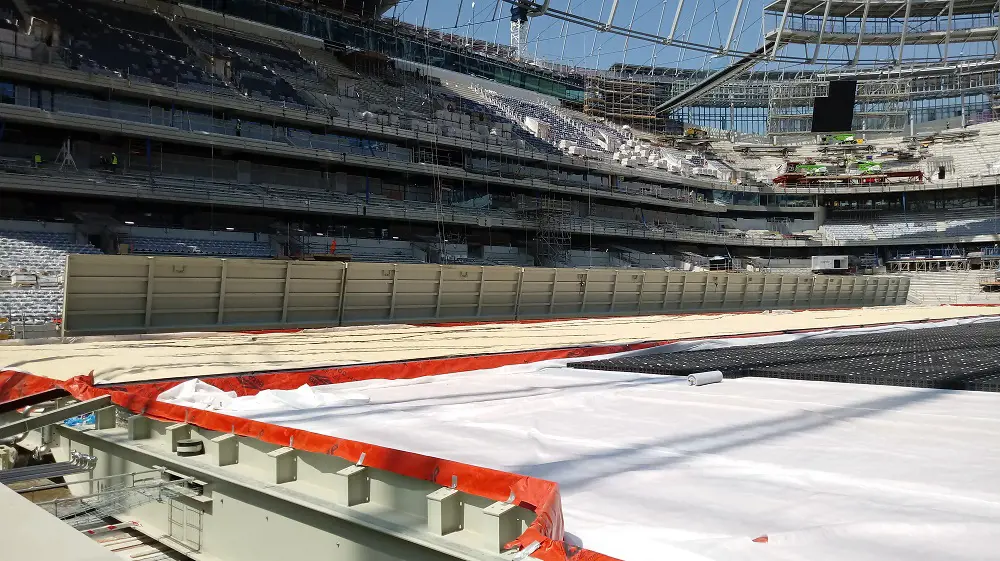
When the NFL pitch is in use, the touchline structure lowers to ground level and the flaps sit flush on the side of the artificial pitch. When the pitch sections are ready to be rolled in, the flaps can be raised into a vertical position at the touch of a button © Tottenham Hotspur / SCX Special Projects
Flexible but stable
With something of this size raised off solid ground, there was a danger that it could behave very differently from standard football pitches. Running on a large steel structure suspended above the ground will cause it to bounce, so the team faced the challenge of making sure the whole structure did not turn into a giant trampoline. A bouncy pitch could affect the way that players move or jump for a header, how goalkeepers leap to make a save, or the way the ball bounces, and would have interfered with the whole game. The team fitted a series of accelerometers around a football field during a game to monitor vibrations and find out how a normal pitch behaved. Engineers also tested a movable pitch at the University of Phoenix Stadium in Glendale, Arizona, during a match between Real Madrid and LA Galaxy to work out what the optimal resonant frequency should be. Widening the main structural beams allowed the engineers to tune the pitch to the right frequency, so that it feels like solid ground.
While the structure needed to be solid, it also had to be flexible. Changes in temperature could cause the steel frames to expand and contract, meaning the pitch can grow or shrink by up to 45 millimetres in all directions. To cope with this constantly changing size, engineers designed the 598 wheels that support the pitch sections so that they do not slip off the rails as it moves. Each section of pitch runs on three rails, and the wheels on the central rail have a flange on both sides to keep the trays running in a straight line. However, the wheels running down the outer rails have no flange, allowing them to move left and right across the rail as the weather conditions shift.
The front wheels of each pitch section have also been fitted with steel scrapers and brushes to clear the rails of any dirt or debris that might get washed down onto the rails. While a waterproof liner seals the pitch trays to prevent any sand or soil spilling down onto the rails, bad weather can wash debris under the pitch, meaning this cleaning mechanism is essential. An integrated watering and drainage system in the pitch ensures that the grass can get the nutrients it needs to grow without making the ground beneath waterlogged. The systems can be quickly disconnected when the pitch needs to be moved. When the pitch is stored under the stands, LED lights provide the grass with just enough light to stay alive but not enough to cause it to grow. A ventilation system also pushes air over it to prevent it from becoming too hot, cold or damp.
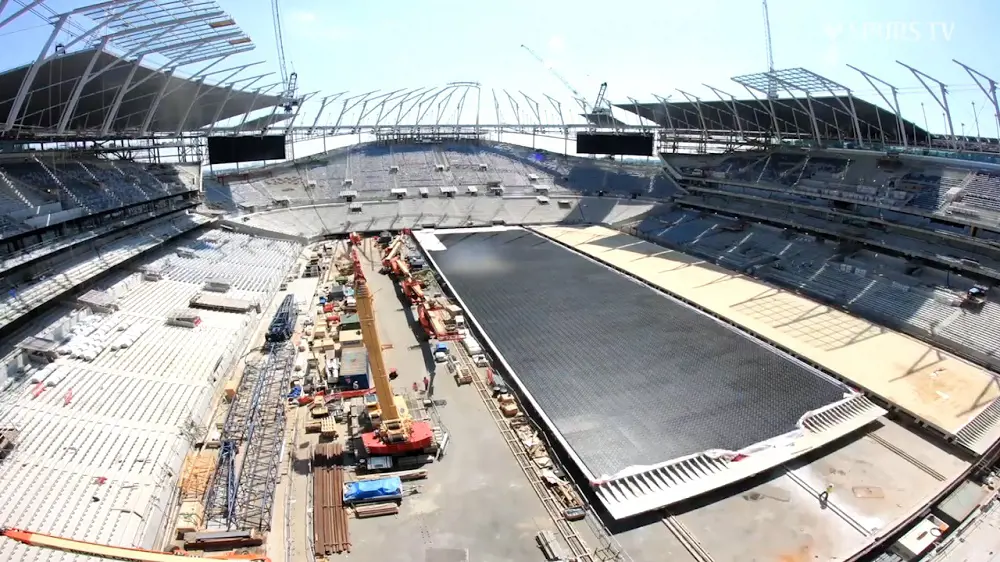
The retractable pitch passes its first tests in May 2018 during the building of the stadium © Tottenham Hotspur / SCX Special Projects
Always prepared
Over the years, SCX has learned that an ‘over engineering’ strategy is the key to success in this sort of large moving project, because it is hard to know exactly what obstacles might need to be overcome when it is operating. It pays dividends to have extra capacity in hand.
SCX finished installing the pitch in October 2018 – just over six years since it first started working on the project – and the first matches are set to be played in 2019.
This feat of engineering may mean that the stadium will become almost as famous for its world-first pitch, as it is for its football team.
***
This article has been adapted from "The football pitch in three pieces", which originally appeared in the print edition of Ingenia 77 (December 2018).
Contributors
Richard Gray
Author
Danny Pickard joined SCX Special Projects as a design engineer after graduating in 2007. He has delivered a wide range of mechanical handling and specialist crane solutions and became their CEO in September 2022. He is now the CEO of Kinetic Solutions Group.
Keep up-to-date with Ingenia for free
SubscribeRelated content
Civil & structural

Building the Shard
The Shard is one of London's most iconic buildings. The tallest in Western Europe, it was designed by Italian architect Renzo Piano and dominates the city’s skyline. Ingenia spoke to John Parker, project director for structural engineers WSP, who outlined the engineering decisions made in building the enormous steel and glass structure.
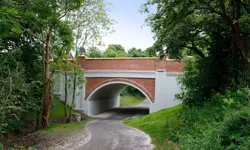
FlexiArch
Arch bridges are strong, durable and require little maintenance. However, very few had been built since the early 1900s until the FlexiArch was developed and launched in 2007. Now, there has been a minor renaissance for this ancient form of construction.

Creating user-friendly buildings
For Michelle McDowell, a former Business Woman of the Year, a passion for joined-up design thinking and building information modelling with a user-friendly approach has enabled her to pioneer revolutionary changes in her field.
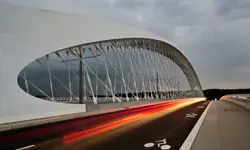
Troja Bridge
In November 2014, one of the world’s largest network arch bridges was officially opened in Prague. The UK may soon have its first network arch bridge if the go-ahead is given for a new rail project in Manchester.
Other content from Ingenia
Quick read

- Environment & sustainability
- Opinion
A young engineer’s perspective on the good, the bad and the ugly of COP27

- Environment & sustainability
- Issue 95
How do we pay for net zero technologies?
Quick read

- Transport
- Mechanical
- How I got here
Electrifying trains and STEMAZING outreach

- Civil & structural
- Environment & sustainability
- Issue 95